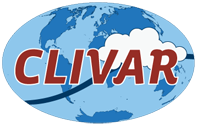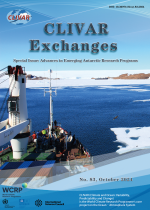【POSTPONED】Ocean Heat and Freshwater Storage and Transports in Observations and Climate Models
Ocean Heat and Freshwater Storage and Transports in Observations and Climate Models
Workshop Venue: Met Office, Exeter, UK
Workshop Dates: Postponed to 2021
The workshop is planned to be held in October 2021, dates to be determined. Please stay tuned for future updates.
Supporting agencies: UK Met Office, the GCOS-GOOS-WCRP Ocean Observations Physics and Climate Panel (OOPC), and the WCRP Climate and Ocean Variability, Predictability, and Change (CLIVAR) Project
Call for Abstracts The call for abstracts for talks and posters has opened and has been closed on 22nd May 2020. For abstract submission, please fill in this Abstract Submission Form and send to Maria Hood. Participation is limited to 70 people. The agenda will be finalized in late June and general registration will be open in July. Please note that priority for attendance will be given to participants who have submitted an abstract. Participants are expected to be self-funded. A limited amount of funding is available. See the call for abstracts opening on 20 April for more details.

Workshop Aims:
- Explore the use of emerging observation-based estimates of large-scale energy and water transports in model evaluation, assessment and development
- Assess the current capability of the ocean observing system to constrain changes in heat and freshwater storage and identify priority areas for new observations
- Assess the current state of heat and freshwater conservation in Earth system and climate models
The workshop will explore the utility of emerging observation-based estimates of Earth’s large-scale heat and freshwater transports to aid understanding climate model simulations by bringing together expertise from both the observational and modelling communities. A central aim is to develop a suite of metrics for routine use in climate model assessment and development to promote increased fidelity in simulations of the energy and water cycles and to help address long-standing climate model biases.
A second element of the workshop will explore the utility of model simulations as a test-bed for the current and future observing system through “synthetic observation” approaches, focussing on our ability to monitor storage changes and close regional heat and freshwater budgets. These approaches will be used to assess the capability of the current observing system to constrain climate variability and change and develop recommendations for future evolution of the ocean observing system.
The final part of the workshop will bring together scientists across modelling centres to assess the current state and challenges associated with heat and freshwater conservation in model systems. The aim is to use the workshop as a jumping off point for a review paper on the current status of heat and freshwater conservation in state-of-the-art climate and Earth system models and to discuss the implications for downstream climate applications.
Anticipated Outcomes:
- A community-led set of priority metrics for large-scale heat and freshwater transports and observational targets based on the current observing system
- A community view on priorities for future ocean observations that would accelerate key process understanding and model development
- Develop a series of “case study” papers on use of synthetic observations for observing system assessment and estimating uncertainties in global indicators of climate change
- Review paper on the status, challenges and opportunities for heat and freshwater conservation in coupled climate models
Organizing Committee
Matt Palmer (OOPC/Met Office Hadley Centre), Karina von Schuckmann (Mercator Ocean International), Till Kuhlbrodt (NCAS, University of Reading), Lijing Cheng (IAP, Chinese Academy of Sciences), Paul Durack (PCMDI / Lawrence Livermore), Gokhan Danabasoglu (NCAR), Maria Hood (OOPC/WMO), Tristan L’Ecuyer (U. Wisconsin-Madison), Adele Morrison (Australian National University), Bernadette Sloyan (CSIRO), Neil Swart (Environment Canada / CliC), Amy Solomon (CU/NOAA/NORP)
For more information, visit the workshop web site at: https://www.goosocean.org/HFworkshop or contact Maria Hood at mhood@wmo.int













